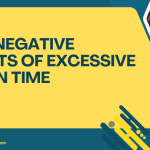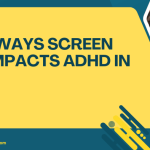Table of Contents
- Introduction
- 1. Blue Light Disruption
- 2. Mental Stimulation
- 3. Delayed Sleep Onset
- 4. Sleep Cycle Interruption
- 5. Emotional Impact
- FAQs
- Conclusion
Introduction
In our hyper-connected world, screens have become an integral part of our daily lives. From smartphones to laptops, we often find ourselves glued to screens for hours on end. While these devices provide us with endless information and entertainment, they also come with a hidden cost: poor sleep quality. In this article, we will explore the top five ways screen time impacts your sleep quality, backed by research and expert opinions. By understanding these effects, you can make informed choices about your screen habits and improve your sleep.
1. Blue Light Disruption
What It Is:
Blue light is a high-energy visible light emitted by screens. It has been shown to interfere with the production of melatonin, the hormone responsible for regulating sleep.
“Melatonin is crucial for maintaining a healthy sleep cycle. Disruptions can lead to a cascade of health issues.”
How It Affects Sleep:
When exposed to blue light, particularly in the hours leading up to bedtime, your body’s internal clock (circadian rhythm) can be thrown off. Research indicates that melatonin production can be delayed by up to two hours when exposed to blue light before sleep (Harvard Health).
What You Can Do:
Consider using blue light filters on your devices or wearing blue light-blocking glasses in the evening. Additionally, try to limit screen time at least an hour before bedtime to allow your body to prepare for sleep naturally.
2. Mental Stimulation
What It Is:
Engaging with screens often involves active participation, whether it’s scrolling through social media, watching intense videos, or playing video games.
“Your brain deserves a break! Think of it as a workout for your mind—overdoing it can leave you exhausted.”
How It Affects Sleep:
This mental stimulation can keep your brain alert when it should be winding down. A study from the University of Michigan found that individuals who engaged with stimulating content before bed experienced more difficulty falling asleep and reported lower sleep quality (University of Michigan).
What You Can Do:
Opt for calming activities before bed, such as reading a physical book, practicing meditation, or listening to soothing music. Creating a relaxing bedtime routine can help signal to your brain that it’s time to wind down.
3. Delayed Sleep Onset
What It Is:
Delayed sleep onset refers to the difficulty many people face when trying to fall asleep after prolonged screen time.
“Recognizing sleep procrastination is the first step in overcoming it. Awareness can lead to better choices.”
How It Affects Sleep:
The stimulation from screens can lead to what’s known as “sleep procrastination,” where you find it hard to put down your device and go to bed. This can result in a cycle of delayed sleep and reduced total sleep time, ultimately impacting your overall health (Sleep Foundation).
What You Can Do:
Set a specific time to turn off your devices each night. You might also consider using apps that remind you when it’s time to disconnect. Creating a tech-free zone in your bedroom can also help create a more sleep-conducive environment.
4. Sleep Cycle Interruption
What It Is:
The sleep cycle consists of various stages, including light sleep, deep sleep, and REM sleep. Quality sleep is crucial for physical health and cognitive function.
“Interruptions during sleep can lead to a tired mind and body, affecting your performance the next day.”
How It Affects Sleep:
Frequent notifications or alerts from devices can disrupt your sleep cycles, causing you to wake up during the night. According to a study published in the Journal of Clinical Sleep Medicine, individuals who slept with their devices nearby were more likely to experience sleep disruptions (Journal of Clinical Sleep Medicine).
What You Can Do:
Consider using the “Do Not Disturb” feature on your devices, or leave your phone in another room while you sleep. This simple change can help you achieve more uninterrupted sleep.
5. Emotional Impact
What It Is:
Screen time, especially on social media, can influence your emotional well-being.
“Your emotional health is deeply intertwined with your sleep. A positive mindset can pave the way for restful nights.”
How It Affects Sleep:
Comparing yourself to others or consuming negative news can lead to anxiety and stress, which are known to negatively affect sleep quality. A study from the American Psychological Association found that individuals who frequently used social media reported higher levels of anxiety and lower sleep quality (American Psychological Association).
What You Can Do:
Limit your exposure to distressing content, especially before bed. Engaging in positive activities like gratitude journaling or mindfulness exercises can help improve your mood and prepare you for a restful night’s sleep.
FAQs
Q1: How many hours of screen time is too much before bed?
A: Experts recommend limiting screen time to less than one hour before bedtime to promote better sleep quality.
“Less screen time, more sleep time! It’s all about finding the right balance.”
Q2: Can using night mode on my devices help?
A: Yes, many devices now come with a night mode that reduces blue light exposure, which can help lessen the impact on your sleep.
Q3: Is it safe to use screens in bed?
A: While it’s not inherently unsafe, using screens in bed can lead to poor sleep quality. It’s best to create a separate space for sleep that is free from screens.
Conclusion
Understanding the ways screen time affects your sleep quality is the first step toward making positive changes. By being mindful of your screen habits and implementing strategies to reduce their impact, you can enhance your sleep quality and overall well-being. Remember, sleep is not just a luxury – it’s a necessity for a healthy life. So, put down the screens, unwind, and enjoy a good night’s sleep!
For further insights into neuro care and its impact on overall health, check out our related articles, such as Top 5 Essential Insights on Neuro Care You Need to Know and Top 5 Lifestyle Changes for Better Neuro Health. These resources can help you understand the broader implications of health and wellness in connection with sleep and screen time.
Section 1
This is the content for section 1.
Section 2
Subsection 2.1
This is the content for subsection 2.1.
Subsection 2.2
This is the content for subsection 2.2.
Section 3
This is the content for section 3.
Sure! Please provide the Markdown content that you would like me to convert to HTML.






